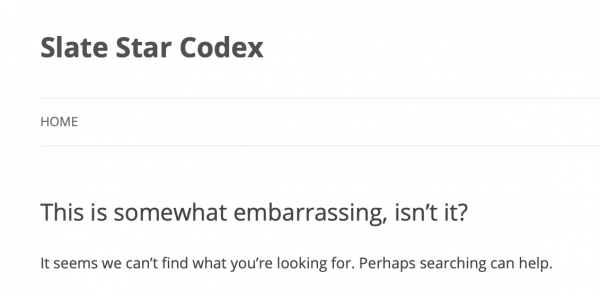Competing visions of the purpose of free speech.
Blanked Slate

The New York Times cancels social science in the name of social justice.
This last week, the most online people I follow were swept with a fresh fear of doxxing. This time it was Rationalist communities—internet friend groups dedicated to the frank and careful examination of ideas unfiltered by ideology—who were being willfully exposed to cancelation by the national media.
What safety measures should be taken, my follows grilled one another? Locking down one’s Twitter account to prevent strangers from viewing one’s tweets? Fretfully, they shared running rumors about who was being contacted by the New York Times for doubtless nefarious purposes.
As gossip goes this is not very good, but I paid attention. A lot of innocent young ones were about to wake up to a reality that some of us have been worried about for a while—the online metamorphosis of the culture wars.
It’s hard to say when reality will dawn on the very online. American life is quite compartmentalized already (you may see cities burning on your phone screen, but you’re likely to go on with your life just the same…). And now, still worse, the young are really and truly unaware that the world they live in is real—that is, beyond their very narrow confines.
Worst of all, the ethical rules that allowed for this compartmentalization are being re-written faster than people are ready to acknowledge, much less predict, and nobody knows what the future holds.
What this month (at least) held was one such attack on our old-timey rules: Slate Star Codex deleted his blog because the NYT was threatening to doxx him. After all, the odds of him losing his job or facing death threats are just small enough to be sporting to the good people at the Grey Lady.
Which means that this popular anonymous blogger, as sweet-natured a liberal as you can hope to find, has finally found himself on the wrong side of the madness of the times. I mourn the loss of his innocence—for years, with compounding success, he devotedly practiced what I like to call (only a little ironically) apolitical science.
The Positivist Dream
Slate Star Codex was mostly of interest to people who want refuge from partisan hatred and who prefer solid academic, data-driven thinking. Ideal for public policy, you might think, and also, well, any humane scientist who entertains the hope that politics is just a bad dream. The right combination of good intentions and data will eventually solve it!
Since our politics and our way of life are increasingly dependent on scientific expertise, positivism has become the belief system of our elites, which makes reality seem like a malfunctioning but intriguing machine, the secret to its “fix” ever just around the corner. We make up reality—we refuse to live up or down to models and are even recalcitrant to science, sometimes for no better reason that we don’t like to be so transparent. We insist on being ourselves, free, if possible, of manipulation by impersonal systems.
Positivism makes all this unpleasant stuff go away. There is always new jargon for the geeks among us to experiment with—as the more sentimental liberals experiment with ever-newer euphemisms for the things they are afraid to say and angry at others for saying. Moreover, the language of social science continuously allows for metaphors, if not good ones, and therefore poetry can pretend to be science, and every dream can come true under this dispensation.
What makes positivism such a wonderful religion for our mathematical tribes is that it is a new, scientific-sounding version of the age-old promise to finally overcome the ugliness of our humanity. Algorithms don’t get angry, statistics don’t kill anyone, and experiments can counterfeit human personhood altogether—we need never worry again about self-knowledge, or pesky things like mortality. With science, worship and rewards are supposed to go together: what you see is what you get. Progress is not only guaranteed; it doesn’t even require very much investment on our part.
Human Sacrifice
Of course, there are always far fewer people who worship numbers than those who don’t. The greatest failure of the Enlightenment is that this part of our nature still remains unchanged. The desire for Progress is, however, much more widespread than our scientific knowledge. It’s not really limited by respect for empirical social science, either. Indeed, Progressives have come to be dissatisfied with the importance given to people more rational, but less angry than themselves. The time has come to replace scientific arguments with arguments of a political character.
This conflict between the two different beliefs dominating among our elites is now playing out over the internet and will inevitably destroy lives. Slate Star Codex is not just one writer. It’s also a hangout for geeks. These days, that’s guilt without appeal. It’s mansplaining, it’s white privilege, it’s who knows what else, all rolled into one.
It will be hard even to feign surprise when the accusations of racism and sexism get piled on in addition. All the apolitical Twitter accounts I follow knew this, too, which is why they were scared of the tender mercies of the NYT.
Positivism promises Progress without pain—technology and institutions together, and everyone thriving in peace. Unfortunately, it creates hierarchies it apparently cannot justify publicly—so now we see historicism advance claims about oppression, injustice, and exploitation that undermine every claim of meritocracy.
Hysteria about systemic racism isn’t just bad news for Christian conservatives, then: libertarian techies are just as vulnerable. Perhaps more so, since they are more enviable.
Progress requires vengeance, punishment, and hatred of the past, especially when ideas about the future run out. In short, it requires human sacrifices. So the NYT has organized an old media v. new media conflict—an exposé to intimidate a man who became too successful without being one of the institutional elite of liberalism. He’s part of the new digital world, not the old TV world, and yet Slate Star Codex is yesterday’s liberalism—the scientific community—in today’s world—the social justice scientific community.
Cows to the Slaughter
Over the years, Slate Star Codex has persuaded tens of thousands of people to take an interest. What happens if it turns out it’s mostly white men? They might wish to make a community for themselves online—indeed, there’s a large reddit following, as well as a Discord channel for the chatty types.
These guys may see Slate Star Codex as a kind of heroic founder-figure, if they’re being honest. But how will they defend themselves when anonymity is their only idea? That, again, is yesterday’s thinking and practices in today’s world of doxxing.
It’s not an accident that the apolitical would become victims of the savvier, more exploitative people looking to thrive in the new media environment. Old media institutions trying to survive will eventually turn to the only job their prestige and journalistic skills can successfully accomplish—policing. To survive, these institutions have to take over the new digital realm, with a lot of help from tech oligarchs who tolerate mobs and look to prove their own moralistic credentials as they grow rich out of all this misery they’re encouraging.
Fact checking has failed as a new media model; playing at censoring Trump is a stupid and empty gesture. But canceling white males and demonetizing or doxxing them whenever possible is actually quite likely to succeed. The resources are there, the youth are vulnerable despite their tech savvy, and there are many, many activists and aspiring minions of Progress looking for the opportunity, or at least the satisfaction. Just as there is an identity built around Slate Star Codex and other such venues—one that gives people habits, manners, ideas—so also there is another one built around destroying these venues.
Positivism eventually will lose to historicism, because historicism is willing to accuse everyone of racism, a dangerous and often effective thing to do in America. It doesn’t matter that it’s wrong—it only matters that it will prove how many cowards are out there, especially people who have lives to protect and loved ones to fear. They will be cowed as easily as everyone else has been so far. The victims deserve our pity—it’s their success that makes them vulnerable, and that success was essentially evidence of public spiritedness, even among the apolitical.
Very Online Conservatism
We need to look for an alliance with the various online identities that are learning how vulnerable they are to Progress. They think they are “progressive” themselves, in the sense that they are new and they are not brainwashed by television. That may prove an optimistic perspective, but we ourselves have to recreate conservatism as a political movement online. We have to win the youth and everyone else dispossessed by the new coalition of elites and mobs. They will come for us, too. They already are.
We have to put our hopes where reason indicates—the madness of the times can teach people that we are by nature political animals, that we have to be more serious about ourselves and less given to fantasies, even the ones that look like science. Conservatives have already spoken in defense of Slate Star Codex and against the doxxing in various venues. But what we really have to offer is confidence born of political knowledge.
We understand why the old conflicts are coming back in new venues, why we cannot overcome our nature or even abandon the character formed into us. We have to use our influence to persuade the more reasonable among the Rationalists that they can learn about human nature and politics. Perhaps anger and indignation at the way they’ve been treated will remind them they are human, even if they have a foolish tendency to think about human beings by making experiments on rats. Because they are now treated like rats by Progressives.
My fellow conservatives, let’s invite the leaders of the new online identities to become part of a new conservatism. Their freedom of speech as much as ours is at stake. We can teach them about politics, but only if we remember our teaching—science is not enough, consent is also required. We have to persuade them that they need be neither powerless nor clueless. This demands more than words: we need organizations, money, leaders—and all the time remaining.
The American Mind presents a range of perspectives. Views are writers’ own and do not necessarily represent those of The Claremont Institute.
The American Mind is a publication of the Claremont Institute, a non-profit 501(c)(3) organization, dedicated to restoring the principles of the American Founding to their rightful, preeminent authority in our national life. Interested in supporting our work? Gifts to the Claremont Institute are tax-deductible.
The prognosis for free speech in America promises marked improvement.
Elon Musk In the Age of Algospeak.
The Alex Jones case and our "cold" information war.
Elon Musk's Twitter deal will have massive consequences across our society.
The Supreme Court needs to revisit its flawed ruling in New York Times v. Sullivan.






